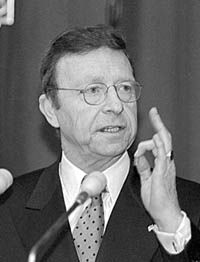“If we want to cooperate in the sphere of international security, we must all carry out military reforms,” Klaus Kleiber, Assistant to the NATO Secretary General on Political Affairs (photo), said at the Institute of International Relations, noting that this applies not only to Ukraine but also to NATO member-states. In his opinion, the future armed forces should have lesser numerical strength but be more mobile. To successfully continue the cooperation, partners should find a common foundation of security, a common vision, common procedures, and a common language.
In Kyiv, Mr. Kleiber participated in a round table called The Role of Parliament in Imposing Civilian Control over the Armed Forces organized by the Verkhovna Rada Committee for National Defense and Security and the Ukraine-NATO work group. The NATO Secretary General’s assistant expressed his hope that Ukraine would establish successful civilian control over its armed forces.
Chairman of the parliamentary committee, Borys Andresiuk, told the participants that the dates of round tables, begun by the committee in March-June, coincide in time with the discussion of the respective bills. When drawing up these documents, the parliament will take into account the experience of countries that have already introduced civilian control, as well as the remarks of NATO and other organizations. Such round tables attended by Western experts will be held monthly.
As to assessment of the current situation in Ukraine by the West, particularly by NATO, Mr. Kleiber quoted himself as telling parliamentary committees’ chairmen Andresiuk and Ihor Ostash along with Deputy Foreign Minister Kharchenko that the West is watching closely the developments in Ukraine, expressing its preoccupation, and insisting that all problems be solved exclusively by means of political dialogue.







